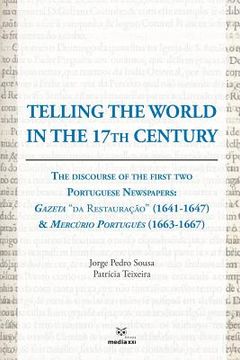Share
Telling the World in the 17th Century: The Discourse of the First Two Portuguese Newspapers: Gazeta "da Restauração" (1641-1647) & Mercúrio Português (in English)
Jorge Pedro Sousa
(Author)
·
Patrícia Teixeira
(Author)
·
Independently Published
· Paperback
Telling the World in the 17th Century: The Discourse of the First Two Portuguese Newspapers: Gazeta "da Restauração" (1641-1647) & Mercúrio Português (in English) - Teixeira, Patricia ; Sousa, Jorge Pedro
$ 15.20
$ 19.00
You save: $ 3.80
Choose the list to add your product or create one New List
✓ Product added successfully to the Wishlist.
Go to My WishlistsIt will be shipped from our warehouse between
Tuesday, July 30 and
Wednesday, July 31.
You will receive it anywhere in United States between 1 and 3 business days after shipment.
Synopsis "Telling the World in the 17th Century: The Discourse of the First Two Portuguese Newspapers: Gazeta "da Restauração" (1641-1647) & Mercúrio Português (in English)"
Two news periodicals witnessed the genesis of Portuguese journalism. They were the Gazeta nicknamed "of the Restoration" (1641-1647) and the Mercúrio Português [Portuguese Mercury] (1663-1667). Both emerged in a context of crisis. Portugal was at war with Castile after a group of conspirators orchestrated a separatist coup in December 1st, 1640, acclaiming D. João IV as King of Portugal, giving rise to the Bragança dynasty and ending the 60 year-period of dual monarchy under the Habsburgs and the Iberian union between Castile and Portugal. The onset of Portuguese news periodicals is closely connected to the resulting political, military and social conflicts, namely the "Acclamation War" and the "Restoration of Independence." What are the characteristics of the first Portuguese news periodicals? If Portuguese 17th century news writing was structurally similar to nowadays journalism, may those first Portuguese periodicals be considered newspapers? What was written and how were written the first Portuguese periodicals? What events and issues were awarded importance and to what extent were those events also considered important by nowadays historians? Do the versions of the stories in the first Portuguese periodicals match the historical version from nowadays' historians? What did the Gazeta andMercúrio Português witness and how were those events narrated and the problems addressed? What were the meanings conveyed by their texts? Their discourse is mostly similar or mostly dissimilar? May the published texts be considered news? If so, what are the newsworthiness qualities in the news articles from Gazeta and Mercúrio? Do these news articles include the rethorical devices found in contemporary journalism? What are the possible comparisons between the first Portuguese periodicals and their European counterparts? How did the context of the time affect their discourse? And finally, sixteen years apart, is there an evolution between the Gazeta and Mercúrio Português? Questions such as these were the motivation for this research, whose goal is to describe and compare the discourse of the first two Portuguese periodicals, research object, according to a contextual framework encompassing history, comparativism and journalism.
- 0% (0)
- 0% (0)
- 0% (0)
- 0% (0)
- 0% (0)
All books in our catalog are Original.
The book is written in English.
The binding of this edition is Paperback.
✓ Producto agregado correctamente al carro, Ir a Pagar.

